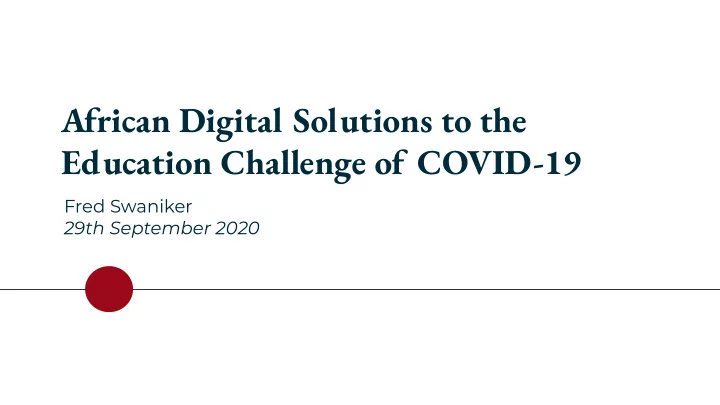

African Digital Solutions to the Education Challenge of COVID-19 Fred Swaniker 29th September 2020
500 Million 1
Constraints drive innovation
The rest of Africa the world
We’ve done this before 2000 2019 16.5 Million Mobile Users 475.8 Million Mobile Users In 2000, Sub-Saharan Africa as a whole had Africa is the world’s leader in fewer telephone lines than Manhattan mobile-money penetration rates. alone
What challenges do we face when 2 scaling education?
The challenges with today’s education 1 2 3 4 We all learn in Learning is High quality The quality also different ways centered education decreases with and yet around a scarce increases with scale & becomes education resource: cost harder to track tailored to be teachers one-size fits all
How can tech solve 3 these challenges?
Personalized Education 1 We can create personalized education that is tailored around a student’s own development
Fewer resources: Greater Reach 2 With technology, 1 teacher can reach many more students locally, nationally and even globally!
Higher quality: Lower costs 3 CD Album: $18.52 60 Million Songs: $2.99 As technology improves, the costs will also significantly reduce over the years. Computer: $95,000 in 1972 Laptop: $200 Today
Tracking data For improvement 4 Technology allows us to collect and track data on education outcomes, but also data on how teachers are performing The use of heat maps can allow us to track education outcomes across different states and cities.
How have we been 4 doing it at ALG?
Growing over last 5 years 2015 2016 2017 2018 2019 ALU Mauritius ALUSB ALU Rwanda ALX Nairobi ALX Johannesburg ALX Lagos ALU SOWC AIIP ALX Casablanca ALX Dakar
Our growth: Over the next 5 years Leaders Graduated Leaders Graduated 400,000 30,000 350,500 (Projected growth 21,470 (Projected growth Pre-Covid) After Covid) 300,000 20,000 200,000 12,872 150,500 10,000 100,000 6,768 50,500 3,512 1,645 25,000 500 0 0 2020 2021 2022 2023 2024 2024 2023 2022 2021 2020 ALG 8 12 18 28 33 Locations A Hybrid model of both digital and in-person learning
Reducing cost, increasing scale ALA Annual Cost to Attend $30K ALU Mauritius $15K ALU Rwanda $7K ALX $2K ALX + ISA $0 250 Students 3 Million Leaders
ALU: An innovative learning model
ALX: Empowering young leaders Digital Launchpad Pathways (6-8 Months) (+ Months) Self-paced and structured around competencies. Centers on 8 meta-skills. Choose your adventure. Entrepreneurship CAREER Self People Systems Critical OF Leadership Leadership Leadership Thinking Digital Economy Adaptable Workforce Effective Data-Based Planning & Innovation & Communicatio Decision-Makin Execution Entrepreneurship n g 6+ Month Intensive Program = Unlock Potential and Launch Career
ALU School of Business: A fresh approach to business education Business & Management Foundations Advanced Business & Management Application in Africa Term 1 Term 2 Term 3 Term 4 Term 5 Business & Management Understanding Leadership Strategy & Vision Leading with Impact Term Themes Perspectives African Markets Foundations In-person Intensive #1 In-person Intensive #2 In-person Intensive (Kigali, Rwanda) (Kigali, Rwanda) #4 (Kigali, Rwanda) In-person Intensive In-person Intensive #5 Harvard Business Wharton Business #3 (Kigali, Rwanda) Learning McKinsey Academy (Kigali, Rwanda) School Online School Online Channels Online Coursework Coursework Coursework ALU Online Capstone Project Coursework ALU Online ALU Online ALU Online Coursework Coursework Coursework
Holberton: The next generation of software engineers About “Holberton provides a high quality, computer Holberton students early Career Pay science education at scale, for anyone, without the limitations of traditional education.” Holberton $107,000 Stanford University $105,000 Our Partnership University of California Berkeley $102,800 Cost: $250/year for programming ● Software Development skills: Leverage ● Yale University $101,800 online learning platform for teaching programing skills Dartmouth College $100,000 Duration: 12 month program ● California Institute of Technology $98,800 Focus: Digital Economy ● Equip young Africans with demanded ● programming skills, to compete in the global job market
Our impact so far More than 2,500 placements to date 2000+ Young Leaders developed 4.5/5 Average rating from managers 200+ Ventures created by alumni and students
What they are saying... The Harvard of Africa 1 of 8 Places In The World Where History Is Being Made Fred Swaniker named "Most Influential People of 2019" #39 Most Innovative Company in The World, #1 in Africa How to unlock the talents of young Africans.
Lessons and Insights from the 5 journey
Tech is not the main issue to solve, it’s more about the mindset and pedagogy
70:20:10 Learning Model On the Job Experience 70% Mentoring & 20% Coaching 10% Classroom, Courses & Reading 27
Bloom’s Taxonomy of Learning Create Combining parts to make a new whole We need to think Evaluate Judging the value of information or ideas differently about Analyze Breaking down information into component parts assessments Apply Analyzing the facts, rules, concepts and ideas Understand Understanding what the facts mean Remember Recognizing and recalling facts
Teachers are still crucial to our learning
What’s needed? Leadership Broadband Electricity
Progress is possible but not inevitable Bill Gates 31
Recommend
More recommend